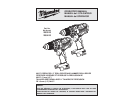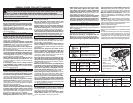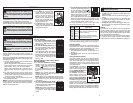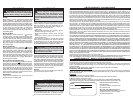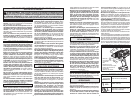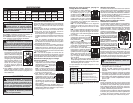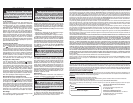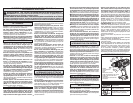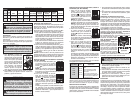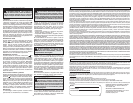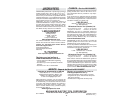
4
5
OPERATION
WARNING Always remove battery
pack before changing or removing
accessories. Only use accessories specifi -
cally recommended for this tool. Others may
be hazardous.
WARNING To reduce the risk of injury,
wear safety goggles or glasses with
side shields.
WARNING To reduce the risk of injury,
always hold securely.
Selecting Drill or Drive Action
(Cat. No. 2603-20)
1. To use the drilling mode, rotate
the torque selector collar until the
drill symbol
appears in line
with the arrow.
2. To use the driving mode rotate
the torque selector collar until the
desired clutch setting appears in
line with the arrow.
The adjustable clutch, when prop-
erly adjusted, will slip at a preset
torque to prevent driving the screw
too deep into different materials
and to prevent damage to the
screw or tool.
Selecting Hammer, Drill or Drive Action
(Cat. No. 2604-20)
1. To use the hammer-drilling
mode, rotate the application
selector collar until the hammer
symbol appears in line with
the arrow. Apply pressure to the bit
to engage the hammering mecha-
nism.
NOTE: The number selected on the torque
selector collar has no effect on operation of the
drill in hammer mode.
NOTE: When using carbide bits, do not use wa-
ter to settle dust. Do not attempt to drill through
steel reinforcing rods. This will damage the
carbide bits.
2. To use the drilling only mode,
rotate the application selector collar
until the drill symbol
appears
in line with the arrow.
NOTE: The number selected on the
torque selector collar has no effect
on operation of the drill in drilling
mode.
Clutch
Setting in. lbs
Applications
1-5
6-10
11-15
16-20
21-24
5-25
28-39
42-68
73-84
86-95
Small screws in softwood.
Medium screws in softwood or small
screws in hardwood.
Large screws in softwoods. Medium
screws in hardwood or large screws in
hardwood with pilot hole.
NOTE: Because the settings shown in the table are only
a guide, use a piece of scrap material to test the different
clutch settings before driving screws into the workpiece.
Selecting Speed
The speed selector is on top of the motor housing.
Allow the tool to come to a complete stop before
changing speeds. See “Applications” for recom-
mended speeds under various conditions.
1. For Low speed, push the speed selector to
display “1”.
2. For High speed, push the speed selector to
display “2”.
Using the Control Switch
The control switch may be set to three positions:
forward, reverse and lock. Due to a lockout mecha-
nism, the control switch can only be adjusted when
the ON/OFF switch is not pressed. Always allow
the motor to come to a complete stop before using
the control switch.
For forward (clockwise)
rotation, push in the control
switch from the right side of
the tool. Check the direction
of rotation before use.
For reverse (counterclock-
wise) rotation, push in the
control switch from the left
side of the tool. Check direc-
tion of rotation before use.
To lock the trigger, push the
control switch to the center
position. The trigger will not work while the control
switch is in the center locked position. Always
lock the trigger or remove the battery pack before
performing maintenance, changing accessories,
storing the tool and any time the tool is not in use.
Installing Bits
Always remove the battery before inserting or
removing bits. Select the proper style and size bit
for the job.
This tool is equipped with a spindle lock. The chuck
can be tightened with one hand, creating higher grip
strengths on the bit.
1. To open the chuck jaws, turn the sleeve in the
counterclockwise direction.
When using drill bits, allow the bit to strike the
bottom of the chuck. Center the bit in the chuck
jaws and lift it about 1/16” off of the bottom.
When using screwdriver bits, insert the bit far
enough for the chuck jaws to grip the hex of the
bit.
2. To close the chuck jaws, turn the sleeve in the
clockwise direction. The bit is secure when the
chuck makes a ratcheting sound and the sleeve
can not be rotated any further.
3. To remove the bit, turn the sleeve in the coun-
terclockwise direction.
NOTE: A ratcheting sound may be heard when the
chuck is opened or closed. This noise is part of the
locking feature, and does not indicate a problem
with the chuck’s operation.
3. To use the driving screws mode
rotate the application selector col-
lar until the drive symbol
ap-
pears in line with the arrow. Then
rotate the torque selector collar
until the desired clutch setting ap-
pears in line with the arrow.
The adjustable clutch, when properly adjusted,
will slip at a preset torque to prevent driving the
screw too deep into different materials and to
prevent damage to the screw or tool.
The torque specifi cations shown here are approximate
values obtained with a fully charged battery pack.
Lock
Push to
CENTER
Reverse
Forward
ASSEMBLY
WARNING Recharge only with the
charger specifi ed for the battery. For
specifi c charging instructions, read the opera-
tor’s manual supplied with your charger and
battery.
Inserting/Removing the Battery
To remove the battery, push in the release buttons
and pull the battery pack away from the tool.
To insert the battery, slide the pack into the body of
the tool. Make sure it latches securely into place.
Installing the Side Handle
1. To install the side handle,
loosen the side handle grip
until the hooks are far enough
apart to fi t into the slots on
the gear case ring. The side
handle can be positioned on
the top, left, or right side of the
tool. Tighten the side handle
grip until it is secure.
2. To remove the side handle,
loosen the side handle grip
until the side handle can be removed. Reposition
and tighten securely.
WARNING To reduce the risk of injury,
always use a side handle when using this
tool. Always brace or hold securely. Ensure
side handle is tightened securely before each
use.
Hooks
Slots
Starting, Stopping and Controlling Speed
1. To start the tool, grasp the handles fi rmly and
pull the trigger.
NOTE: An LED is turned on when the trigger is
pulled.
2. To vary the speed, increase or decrease the
pressure on the trigger. The further the trigger
is pulled, the greater the speed.
3. To stop the tool, release the trigger. Make sure
the bit comes to a complete stop before laying
the tool down.
Drilling
Place the bit on the work surface and apply fi rm
pressure before starting. Too much pressure will
slow the bit and reduce drilling effi ciency. Too little
pressure will cause the bit to slide over the work
area and dull the point of the bit.
If the tool begins to stall, reduce pressure slightly
to allow the bit to regain speed. If the bit binds,
reverse the motor to free the bit from the workpiece.



